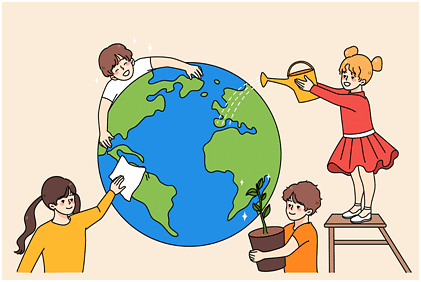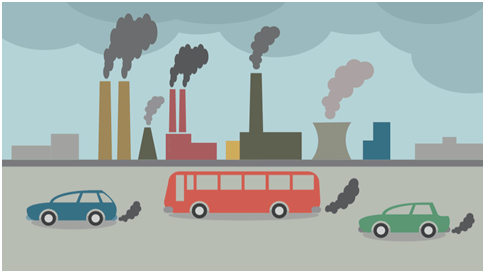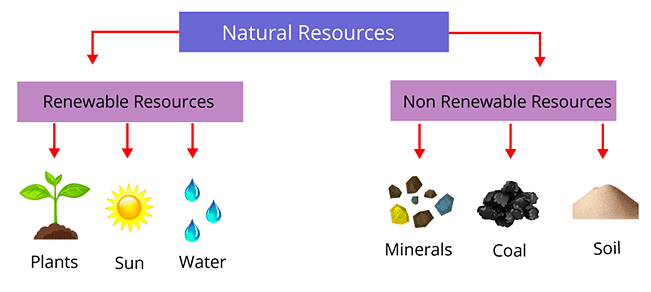Environmental Vocabulary Chapter Notes | English Olympiad for Class 2 PDF Download
Welcome, young learners! In this chapter, we're going to have a lot of fun exploring new words in English. We'll discover the amazing things about our environment and learn important words that help us talk about our planet. Together, we'll find out how to describe the beauty of nature, why it's so important to take care of the Earth, and what we can do to make the world a better place. Get ready to learn some exciting new words about the environment! Let's start our adventure!

1. Environment: The natural surroundings where living organisms exist, including air, water, soil, and ecosystems.
2. Sustainability: Ensuring the balance and longevity of natural resources and ecosystems for present and future generations.
3. Conservation: The careful management and protection of natural resources and wildlife habitats.
4. Biodiversity: The variety of plant and animal species in a specific area or ecosystem.
5. Climate Change: Long-term alterations in global or regional climate patterns, often attributed to human activities such as burning fossil fuels and deforestation.
6. Ecosystem: A biological community of interacting organisms and their physical environment.
7. Pollution: The introduction of harmful substances or contaminants into the environment, affecting air, water, or soil quality.

8. Renewable Energy: Energy sources that are naturally replenished, such as sunlight, wind, and hydropower, and are considered environmentally sustainable.
9. Deforestation: The clearing or removal of forests for human activities, leading to habitat destruction, loss of biodiversity, and environmental degradation.
10. Carbon Footprint: The total amount of greenhouse gases emitted directly or indirectly by human activities..
11. Greenhouse Effect: The natural process by which gases in the Earth's atmosphere trap heat, maintaining the planet's temperature conducive to life.
12. Ozone Layer: A region of Earth's stratosphere that contains a high concentration of ozone, protecting life on Earth by absorbing harmful ultraviolet radiation from the sun.

13. Endangered Species: Species at risk of extinction due to factors such as habitat loss, pollution, climate change, and poaching.
14. Habitat Loss: The destruction, degradation, or fragmentation of natural habitats, leading to the decline of plant and animal populations.
15. Waste Management: The collection, transportation, disposal, and recycling of waste materials to minimize environmental impact and promote sustainability.
16. Ecological Footprint: The measure of human demand on Earth's ecosystems, expressing the amount of biologically productive land and sea area required to support a given population.
17. Renewable Resources: Natural resources that can be replenished or regenerated over time, such as sunlight, wind, water, and biomass.
18. Non-renewable Resources: Finite natural resources that cannot be replaced or regenerated within a human lifetime, such as fossil fuels and minerals.
19. Sustainable Development: Development that meets the needs of the present without compromising the ability of future generations to meet their own needs, balancing economic, social, and environmental factors.
20. Biodegradable waste: Biodegradable waste are items that can naturally break down and decompose over time, usually with the help of microorganisms like bacteria and fungi.
21. Non-Biodegradable objects: Non-biodegradable waste refers to materials that do not break down or decompose easily in the environment over a short period of time. These items persist in the environment for a long time, contributing to pollution and environmental degradation.
In our study of the environment, you can explore other important words like recycling, composting, renewable energy, and sustainability. Conservation efforts aim to protect habitats and reduce our carbon footprint. We'll learn about ozone depletion, greenhouse gases, and the effects of global warming. Fossil fuels, such as coal and oil, contribute to pollution and land degradation. Conservationists advocate for eco-friendly practices and promote biodegradation to combat deforestation. Acid rain, caused by pollutants in the atmosphere, poses a threat to ecosystems worldwide.
|
28 videos|37 docs|82 tests
|
















